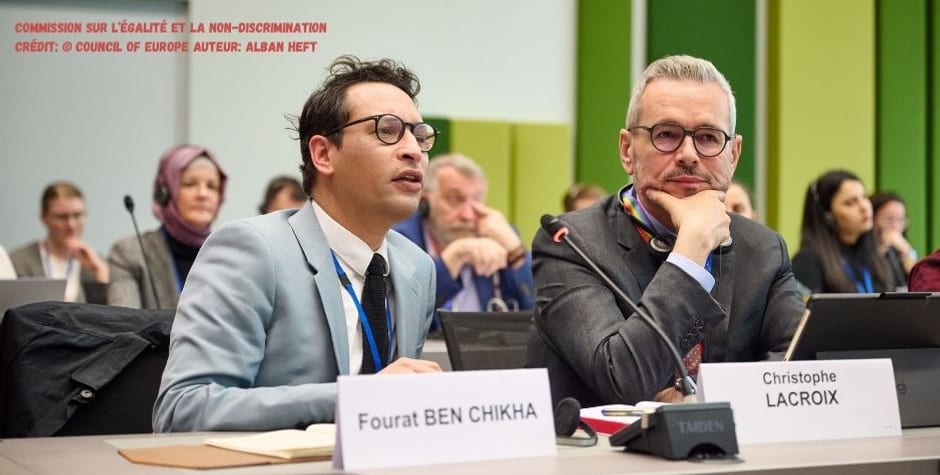

The Council of Europe prepares to call for the total decriminalisation of prostitution
The CoE Prepares to Call for the Total Decriminalisation of Prostitution
On 3 October, the Parliamentary Assembly of the Council of Europe (PACE) will debate and vote on a motion for a resolution on prostitution entitled “Protecting the human rights and improving the lives of sex workers and victims of sexual exploitation” (Doc. 16044 - 13/09/2024). Despite some commendable recommendations, this text and the accompanying report mainly promote the normalisation of prostitution as “sex work”. In this, they are in flagrant contradiction with the initial proposal, which was entitled “The reintegration of persons trapped in prostitution and human trafficking survivors” (Doc. 15570 - 24/06/2022). Over and above a change of title, it is the protection of people in prostitution that is turned upside down: from a “trap”, prostitution is transformed into “work”, which should be normalised in order, supposedly, to improve the lives of its victims.
Photo credit: © Council of Europe / Alban Heft, for educational purposes on the activities of the Council of Europe and free of charge.
A bias in favour of decriminalising prostitution
“The debate on abolitionism versus decriminalisation of sex work” proposed in the report could have been constructive. Unfortunately, it consists of an all-out criticism of the abolitionist vision, which is presented as prejudicial, while the decriminalisation of prostitution is applauded (resol., §10; report, §31 et seq.). To do this, the author draws on a catalogue of international texts that can be interpreted in this way, opinions and reports by experts and international officials in favour, and the sometimes outrageous positions of militant NGOs (Resol., §10). Belgium, “the first country in Europe to fully decriminalise sex work”, is presented as exemplary (resol., §11; report, §46 et seq.). On the other hand, advocates of the abolition of prostitution do not seem to have been consulted. At most, the hearings of the Coalition for the Abolition of Prostitution (CAP) and the European Women’s Lobby (EWL) are mentioned (report, §29-30, 33). As for the recent abolitionist report “Prostitution and violence against women and girls” published by Reem Alsalem, UN Special Rapporteur on violence against women and girls, it is not even mentioned, unlike that of her colleague Tlaleng Mofokeng, UN Special Rapporteur on the right to health, in favour of total decriminalisation of prostitution (report, §61; resol., §10). Finally, the scope of European texts in favour of a legal framework penalising the clients of prostitution is minimised[1] (report, §19, 44). The bias in favour of total decriminalisation of prostitution is therefore obvious, even though it is a direct affront to human dignity.
A denial of reality for an ideological objective
This proposal purports to distinguish between “forced prostitution” and “sex work”, so as to enable the latter to be recognised. However, this vision of prostitution as acceptable is purely ideological and inoperative in international law. It is a denial of reality because it implies admitting the existence of legitimate prostitution: prostitution that is fully chosen or freely consented to, which is extremely rare. It has been established that prostitution is largely exploited by traffickers. In its Resolution of 14 September 2023 on the regulation of prostitution in the European Union, the European Parliament reports eloquent data: “of the around 30 000 people in prostitution in the Netherlands, up to 70 % are considered as having been forced into prostitution by violence or lured into it by a ‘loverboy’[2]”; “on average, 70 % of the individuals in prostitution in the EU are migrant women[3]”; “trafficking in human beings for the purpose of sexual exploitation remains by far the most prevalent form of trafficking in human beings in the EU, given that 51 % of victims of human trafficking in the EU are trafficked for sexual exploitation[4]”. On the other hand, “according to the OSCE, trafficking for the purpose of sexual exploitation generates nearly USD 100 billion per year alone, consisting mainly of money paid by men for sex with trafficked women[5]”. Moreover, the rapporteur himself admits that prostitution is sometimes “neither strictly speaking forced, nor a completely free choice” (Report, §28). In fact, in cases that do not involve trafficking in human beings, a person who prostitutes is at the very least pushed or forced into it by particular circumstances, such as poverty, but always because he or she is responding to the request of a third party. In any event, the law is clear on the question of consent: the consent of a victim of human trafficking to his or her own exploitation is irrelevant when it is obtained by the offer or acceptance of payments or benefits[6]. Like the European Parliament, it is important to remember that “sex must be based on consent, which can only be given freely and voluntarily, and cannot be replaced by the exchange of money; [...] prostitution reduces intimate acts to an assigned monetary value; [...] sexual exploitation through the prostitution of others [...] implies that both a person and their consent to sexual activity can be purchased for a given sum”[7].
Normalising prostitution, an objective incompatible with human rights
Promoting the normalisation of prostitution is contrary to human rights. Whether or not it involves trafficking in human beings, prostitution by its very nature violates human dignity. This is expressly stated in the Preamble to the United Nations Convention for the Suppression of the Traffic in Persons and of the Exploitation of the Prostitution of Others (1949): “prostitution and the accompanying evil of the traffic in persons for the purpose of prostitution are incompatible with the dignity and worth of the human person and endanger the welfare of the individual, the family and the community”. This statement is based on the Universal Declaration of Human Rights (1948), whose Preamble recalls that “recognition of the inherent dignity and of the equal and inalienable rights of all members of the human family is the foundation of freedom, justice and peace in the world”. The United Nations Charter (1946) adds that the peoples of the United Nations are “determined to reaffirm faith in fundamental human rights, in the dignity and worth of the human person, in the equal rights of men and women”. Within the European Union, MEPs reiterated the incompatibility of prostitution with human dignity in the Resolution of 14 September 2023[8] and considered that “sexual exploitation through the prostitution of others is a gross violation of women’s rights and dignity”[9]. In a Resolution of 26 February 2014, they also recognised that “prostitution, forced prostitution and sexual exploitation are [...] violations of human dignity, contrary to human rights principles [...] and [...] to the principles of the Charter of Fundamental Rights of the European Union”[10]. The European Parliament also described prostitution as “a serious form of violence and exploitation” in a Resolution of 5 July 2022 on women’s poverty in Europe[11].
From this point of view, it would be absurd for the PACE to adopt the present motion for a Resolution which calls on legislators “to ensure that sex workers may carry out their activity in dignified conditions” (Resol., §8). Similarly, prostitution cannot be considered as “an important risk factor for violence against women” (report, §12): it is in itself violence. As for renaming the activity of “prostitution” as “sex work”, this in no way changes its nature: it remains intrinsically contrary to human dignity. In its resolution of 14 September 2023, the European Parliament recalls the need to use neutral terms and explains its deliberate choice to use the expression “people in prostitution” by the desire not “to idealise the reality of prostitution or mask the violence, abuse and exploitation that the large majority of people, especially women and girls, in prostitution endure”[12].
The work of a lobby for the normalisation of prostitution
This proposal is clearly the work of a lobby campaigning for the liberalisation and normalisation of prostitution. It should be seen in the context of the case of M.A. and others v. France (application no. 63664/19), a strategic litigation supported by several of these same organisations (European Sex Workers’ Rights Alliance - ESWA, Amnesty International, Médecins du Monde) with the aim of having the European Court of Human Rights (ECHR) condemn France for criminalising the purchase of sexual acts, and thereby declare abolitionism contrary to the European Convention on Human Rights. From the judgment of 25 July 2024, the Resolution and the Report essentially note that, while not finding a violation of the Convention, the Court asks the national authorities “to keep under constant review the approach they have adopted, in particular where it is based on a general and absolute prohibition of the purchase of sexual acts” (§167, Unofficial translation). Since it does not favour the decriminalisation of prostitution, other contributions of this judgment have been overlooked. Nevertheless, it is important to emphasise that the Court refused to declare the abolitionist model contrary to human rights. It also recalled “that it considered prostitution incompatible with human rights and dignity insofar as this activity was coerced” (§142). However, as we have shown, prostitution is almost always coerced in that it is a matter of necessity and not a fully voluntary choice. On this point, it is interesting to note that, while the Court refuses to answer in this judgment “the question whether prostitution may be freely consented to or always results from coercion”, it does admit that “socio-economic conditions” constitute such coercion (§156). It should also be noted that, in his concern to criticise the abolitionist model in order to gain acceptance for decriminalisation, the rapporteur is careful not to point out that the Court refused to link the deterioration in the applicants’ situation to the adoption of legislation based on the abolitionist model: on the contrary, it states that “there is no unanimity as to whether the negative effects described by the applicants are directly caused by the measure penalising the purchase or sale of sexual acts, or are inherent and intrinsic to the phenomenon of prostitution as such, or are the result of a whole range of social factors and behavioural practices” (§155). The rapporteur also fails to mention that the Court found “that none of the public policies implemented in the other States is free of controversy to date” (§158). Not satisfied with having failed before the ECHR, it is now the PACE that this lobby for the normalisation of prostitution is using to achieve its ends.
Behind the laudable objective of defending the rights of people in prostitution, this proposal in fact conceals the legalisation of their exploitation and the regulation of the violence of prostitution. It is therefore important that the members of the Parliamentary Assembly of the Council of Europe shoulder their responsibilities and firmly oppose the adoption of this one-sided Resolution, which is out of touch with the real plight of thousands of women and men in Europe.
_________________________________
[1] Warsaw Convention (2005) on Action against Trafficking in Human Beings, Article 19; European Parliament Resolution (2022/2139(INI)) of 14 September 2023 on the regulation of prostitution in the EU: its cross-border implications and impact on gender equality and women’s rights, 13; PACE, Resolution 1983 (2014) Prostitution, trafficking and modern slavery in Europe, 12.1.1. See also PACE, Recommendation 1325 (1997) Traffic in women and forced prostitution in Council of Europe member states, 6.7.
[2] European Parliament Resolution, 2022/2139 (INI) of 14 September 2023, cons. T.
[3] European Parliament Resolution, 2022/2139 (INI) of 14 September 2023, 26.
[4] European Parliament Resolution, 2022/2139 (INI) of 14 September 2023, cons. X.
[5] European Parliament Resolution, 2022/2139 (INI) of 14 September 2023, cons. X.
[6] Protocol to Prevent, Suppress and Punish Trafficking in Persons Especially Women and Children, supplementing the United Nations Convention against Transnational Organized Crime (Palermo Protocol), Art. 3.b; Directive 2011/36/EU on preventing and combating trafficking in human beings and protecting its victims, Art. 2.4.
[7] European Parliament Resolution, (2022/2139 (INI) 14 September 2023, cons. C.
[8] European Parliament Resolution, (2022/2139(INI)) 14 September 2023, cons. F.
[9] European Parliament Resolution, (2022/2139(INI)) 14 September 2023, cons. C.
[10] European Parliament Resolution of 26 February 2014 on sexual exploitation and prostitution and its impact on gender equality (2013/2103(INI)), 1.
[11] European Parliament Resolution of 5 July 2022 on women’s poverty in Europe (2021/2170(INI)), point 28.
[12] European Parliament Resolution, 2022/2139 (INI) 14 September 2023, cons. A.












